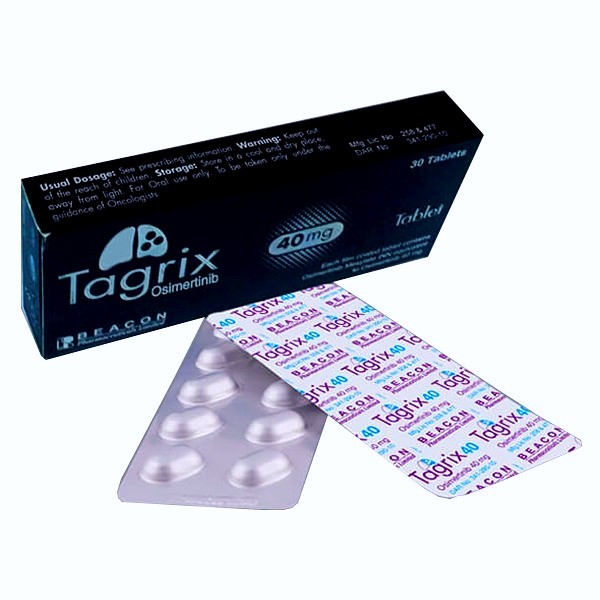Osimertinib
Showing all 4 results
Osimertinib Price, Uses & Side Effects
What is Osimertinib?
Osimertinib is a medication used in the treatment of non-small-cell lung carcinoma (NSCLC), specifically targeting tumors with certain mutations in the epidermal growth factor receptor (EGFR) gene. It’s an oral medication classified as a third-generation EGFR tyrosine kinase inhibitor (TKI), designed to overcome resistance to earlier generation EGFR inhibitors.
This drug has shown efficacy in patients who have developed resistance to first-line EGFR inhibitors like erlotinib, gefitinib or afatinib often due to the development of the T790M mutation. Osimertinib has demonstrated improved outcomes and fewer side effects compared to other treatments in this patient population.
Osimertinib FDA Approval
Osimertinib, a medication used to treat certain types of lung cancer, was approved for use in the US in November 2015 and in the EU in February 2016.
In February 2024, the FDA approved osimertinib, along with platinum-based chemotherapy, for individuals with advanced or metastatic non-small cell lung cancer. This approval applies specifically to those whose tumors have certain genetic mutations (EGFR exon 19 deletions or exon 21 L858R mutations), as determined by an FDA-approved test.
However, in patients treated with osimertinib drug, resistance typically develops within around ten months.
How does Osimertinib work?
Osimertinib is a medication used to treat certain types of lung cancer by targeting specific changes in cancer cells. Here’s a simple explanation of how it works:
Understanding Cancer Growth: Cancer cells grow and spread by using signaling pathways, which are like communication networks within the cells. These pathways tell the cells to keep growing and dividing uncontrollably.
Role of EGFR Protein: In some lung cancers, there’s a protein called EGFR (epidermal growth factor receptor) that has a mutation. This mutation makes the EGFR protein stay constantly active, like a light switch stuck in the “on” position, which tells the cancer cells to keep growing and dividing.
How does Osimertinib Works: Osimertinib is a type of drug called a tyrosine kinase inhibitor (TKI). It specifically targets and binds to the mutated EGFR protein. By doing this, osimertinib blocks the signals that tell the cancer cells to grow.
Targeting Resistant Mutations: What makes osimertinib special is that it can also target a specific mutation called T790M. This mutation often develops after initial treatments with other EGFR inhibitors, making the cancer resistant to those treatments. Osimertinib can effectively bind to and inhibit this resistant form of EGFR.
Stopping Cancer Cell Growth: By blocking the activity of both the original and resistant mutated EGFR, osimertinib stops the cancer cells from receiving the signals they need to grow and divide. This helps to slow down or stop the progression of the cancer.
In summary, it works by targeting and inhibiting the mutated EGFR protein in lung cancer cells. By blocking this protein, it prevents the cancer cells from growing and dividing, effectively slowing down or stopping the cancer.
Osimertinib Side Effects
Common side effects of osimertinib may include diarrhea, rash, dry skin, nausea, decreased appetite, and fatigue. Some people may also experience changes in their liver function tests, such as increased levels of liver enzymes.
More serious side effects of Osimertinib can include interstitial lung disease (ILD) or pneumonitis, which may cause symptoms such as cough, difficulty breathing, or chest pain. Cardiac side effects, such as QT prolongation (an abnormal heart rhythm), may also occur, although they are less common.
Additionally, Osimertinib drugs may cause changes in blood glucose levels, so monitoring blood sugar levels may be necessary for patients with diabetes or those at risk of developing diabetes.
Dosage And Administration
The dosage and administration of osimertinib depend on various factors, including the patient’s medical history, overall health, and the stage of cancer being treated.
For most patients, the standard dosage of osimertinib is 80 mg taken orally once daily. It’s usually administered as a tablet, and it can be taken with or without food. Patients should swallow the tablet whole with a glass of water and avoid crushing, chewing, or breaking it.
For patients experiencing difficulty swallowing
Osimertinib generic tablets can be adapted as follows: Firstly, disperse the tablet in 4 tablespoons (approximately 50 mL) of non-carbonated water only. Stir the mixture until the tablet is completely dispersed, ensuring no solid pieces remain. The patient can then either swallow the mixture directly or, if necessary, it can be administered through a naso-gastric tube immediately.
It’s crucial not to crush, heat, or ultrasonicate the tablet during preparation, as this could alter its effectiveness. After administration, rinse the container used for dispersing the tablet with 4 to 8 ounces of water. The patient should then immediately drink the rinse water or, if applicable, it can also be administered through the naso-gastric tube. This adapted method ensures the patient receives the medication effectively, even with difficulty swallowing, while maintaining its therapeutic properties.
It’s essential for patients to follow their healthcare provider’s instructions regarding dosing and administration carefully. Taking osimertinib consistently and at the prescribed dose is crucial for its effectiveness in treating cancer.
What happens if you miss a Dose of Osimertinib?
If a dose of osimertinib is missed, patients should take it as soon as they remember, unless it’s close to the time for the next scheduled dose. In that case, they should skip the missed dose and continue with their regular dosing schedule. Patients should not take a double dose to make up for a missed one.
Patients should continue taking osimertinib for as long as their healthcare provider recommends, even if they start to feel better. It’s important not to stop taking osimertinib without consulting a healthcare professional, as doing so could affect the effectiveness of the treatment.
Osimertinib Drug Interaction
Strong CYP3A inhibitors:
Drugs that strongly inhibit the enzyme CYP3A can increase osimertinib levels in the body, leading to a higher risk of side effects. Examples include ketoconazole, itraconazole, clarithromycin, and grapefruit juice.
Strong CYP3A inducers:
Conversely, drugs that strongly induce CYP3A may decrease osimertinib levels, reducing its effectiveness. Examples include rifampin, phenytoin, and carbamazepine.
Acid-reducing agents:
Medications that reduce stomach acid, such as proton pump inhibitors (PPIs) or H2-receptor antagonists, may decrease the absorption of osimertinib. It’s generally recommended to avoid taking these acid-reducing agents at the same time as osimertinib.
Warfarin:
Osimertinib may increase the levels of warfarin, a blood thinner, which could lead to an increased risk of bleeding. Close monitoring of the International Normalized Ratio (INR) is advised when these drugs are used together.
QT-prolonging drugs:
Osimertinib may prolong the QT interval in the heart’s electrical cycle. Concurrent use with other drugs that also prolong the QT interval, such as certain antiarrhythmics or antipsychotics, may increase the risk of serious heart rhythm abnormalities.
It’s crucial to inform your healthcare provider about all the medications (prescription, over-the-counter, herbal supplements) you are taking before starting osimertinib or any other new medication. They can assess potential interactions and adjust your treatment plan accordingly to ensure your safety and the effectiveness of your treatment.




